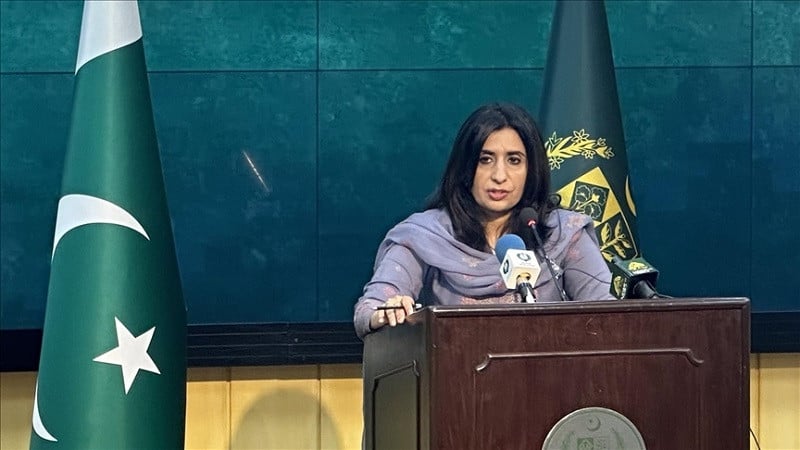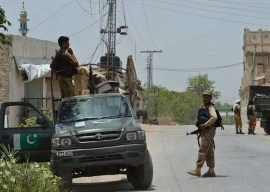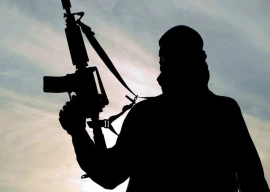
A day after a reported meeting between Maulana Fazlur Rehman and Taliban chief Haibatullah Akhundzada, Pakistan made it clear on Thursday that it had no interest whatsoever in holding talks with the banned Tehreek-e-Taliban Pakistan (TTP).
Pakistani officials also clarified that the visit by the Jamiat Ulema-e-Islam-Fazl (JUI-F) chief was a private one, and he was not representing the government of Pakistan.
The statements from the Foreign Office spokesperson and the information minister came against the backdrop of reports that Fazl’s visit might lead to the resumption of talks with the TTP and that he had gone there with the blessing of the government.
In a weekly media briefing, Foreign Office Spokesperson Mumtaz Zahra Baloch, while clarifying Pakistan’s stance, stated that the TTP had accepted responsibility for numerous terrorist attacks in the country.
“First, Maulana Fazlur Rahman is a private citizen, who is visiting Afghanistan on a private visit at the invitation of the Afghan authorities. This is not a visit sponsored by the government of Pakistan,” she explained.
“Secondly, before his travel to Afghanistan, he visited the Ministry of Foreign Affairs, and the Ministry of Foreign Affairs briefed him on our policy towards Afghanistan,” the spokesperson added.
“This is a normal practice whenever a senior official or political figure wishes to receive a briefing from the Foreign Office, we provide those briefings.”
However, the spokesperson stressed that Fazl was not visiting Afghanistan as an emissary of the government of Pakistan and that he was there in his individual capacity.
“As far as Pakistan’s position with respect to dialogue with TTP is concerned, we have articulated our position several times and reiterated it in this forum and gathering on many occasions. Our position hasn’t changed,” the spokesperson told reporters.
She went on to say that Pakistan was not interested in dialogue with TTP. “We have no dialogue taking place, nor do we intend to have a dialogue with TTP, which is responsible for several terrorist incidents inside Pakistan and is responsible for killing of Pakistani civilians and law-enforcement officials.”
“Our demands from the Afghan authorities haven’t changed, they remain the same, which is that the Afghan authorities should take action, effective action against terrorist elements inside Afghanistan, including TTP leadership,” according to the spokesperson.
Afghan authorities, she continued, should “ensure that the hideouts and sanctuaries inside Afghanistan for these terrorist groups are eliminated and those responsible for terrorist incidents in Pakistan are handed over to Pakistan”. She said: “Our demand … is that they take action against the terrorists.”
Separately, Information Minister Murtaza Solangi said in a statement there would not be any talks with the TTP. He also said the visit of the JUI-F chief to Afghanistan was private but added that the government would welcome if his engagements in Kabul would bring any positive outcome.
Fazl went to Kabul on Sunday, and on Wednesday he travelled to Kandhar on a chartered plane along with a prominent cleric from Khyber-Pakhtunkhwa (K-P) to meet the Taliban chief. This was the first known meeting between any Pakistani leader and the reclusive Afghan Taliban chief.
Haibatullah Akhundazada, who took over the reign of Afghan Taliban in 2016 after the assassination of his predecessor Mullah Mansur in the US drone strike, rarely meets people from outside. Since the Taliban returning to power in August 2021, the cleric runs the country from Kandahar.
This was only the second known meeting Akhundazada held with any outsider, following his interaction with the Qatari prime minister last year. Even though the JUI-F chief went there in a private capacity but his visit was seen as significant in view of the brewing tensions between the two countries.
Officials said the outcome of the visit depended on what message the JUI-F chief would bring for Pakistan. They added that the Taliban leadership was aware of Pakistan’s concerns and demands and hence unless they come up with a workable solution to the TTP issue, there won’t be any change in Pakistan’s stance.
Tensions have been simmering between the two countries in recent months primarily over the lack of action against the TTP by the Afghan Taliban government.
Even during the visit of Fazl, the Taliban government spokesperson reiterated Kabul’s stance that the TTP was Pakistan’s internal issue, and therefore, it had to find a solution from within. Pakistan, however, does not share the Taliban’s perspective.
Previously, Islamabad shared ‘irrefutable evidence’ of the TTP presence on Afghan soil. Publically, the Taliban government may have been denying the presence of TTP on Afghan soil but privately they have been pushing for the resumption of talks. However, Pakistan is adamant that it would no longer hold talks with the TTP.
1719315628-0/BeFunky-collage-(8)1719315628-0-405x300.webp)


1731329418-0/BeFunky-collage-(39)1731329418-0-165x106.webp)




1731771315-0/images-(3)1731771315-0-270x192.webp)












COMMENTS
Comments are moderated and generally will be posted if they are on-topic and not abusive.
For more information, please see our Comments FAQ